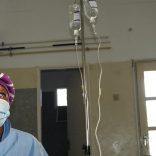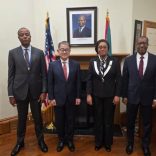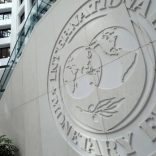Mozambique: Doctors at Maputo Central Hospital threaten to stop working overtime
Markets are not the only source of funding for Mozambique – AfDB

File photo
The resident representative of the African Development Bank (AfDB) in Mozambique, Pietro Toigo, said that financial markets are not the only source of funding for Mozambique’s development, but concedes that the country has difficulties.
“The lack of access to international financial markets is certainly a constraint and the AfDB is working with the government to find a solution to the difficult credit conditions,” Pietro Toigo said on the day after the bank released its strategic report on Mozambique’s outlook through to 2022.
In an interview with Lusa, Toigo stressed that “access to financial markets is not necessarily the only way to finance development”, because international partners accept that “it is important for Mozambique to be able to finance in sustainable terms for ensure economic diversification and prepare for a time when the development of the gas sector will radically change the economic structure [of the country]”.
In the Country Strategy Paper released on Tuesday, the AfDB estimates that financing for Mozambique will be limited to US$381 million by the end of next year because of unsustainable public debt, which limits the amount which the AfDB can make available to the country.
The focus, reads the document, will be “co-financing and mobilising resources as a key element of aid” from the bank to the country.
In addition to the help that international partners are still available to give, Toigo further points out that “Mozambique’s growth in the past was financed through foreign direct investment, usually through project finance structures, rather than through capital markets”.
As an example, Toigo points to the Nacala Corridor, saying that “the AfDB invested US$300 million and raised US$3 billion in private financing, which shows that it is possible to finance infrastructure projects with the potential to promote transformation even in challenging credit conditions”.
What is important in this project, he added, is that it “mobilised a total of US$5 billion (US$2 billion in equity and US$3 billion in debt) from the private sector, without public funds or guarantees”.
In the interview with Lusa, Toigo said that it was important “to revitalise the interest of private investors, on the one hand through reforms of the investment environment and ease of doing business and, on the other hand, developing and promoting a robust flow of bankable projects with a potential to transform the economy”.
The AfDB is working on this front through the launch of the Lusophone Compact, an investment channelling platform for Portuguese-speaking countries in Africa, and the holding of the Africa Investment Forum in November in South Africa, to “attract large international investors such as pension funds and sovereign wealth funds that invest little in the continent” and present to them projects that are now being prepared by Mozambique.
“Overall, I am optimistic about Mozambique’s prospects of dealing with current financial constraints and mobilising the right funding for the country’s economic transformation,” Toigo concluded.













Leave a Reply
Be the First to Comment!
You must be logged in to post a comment.
You must be logged in to post a comment.